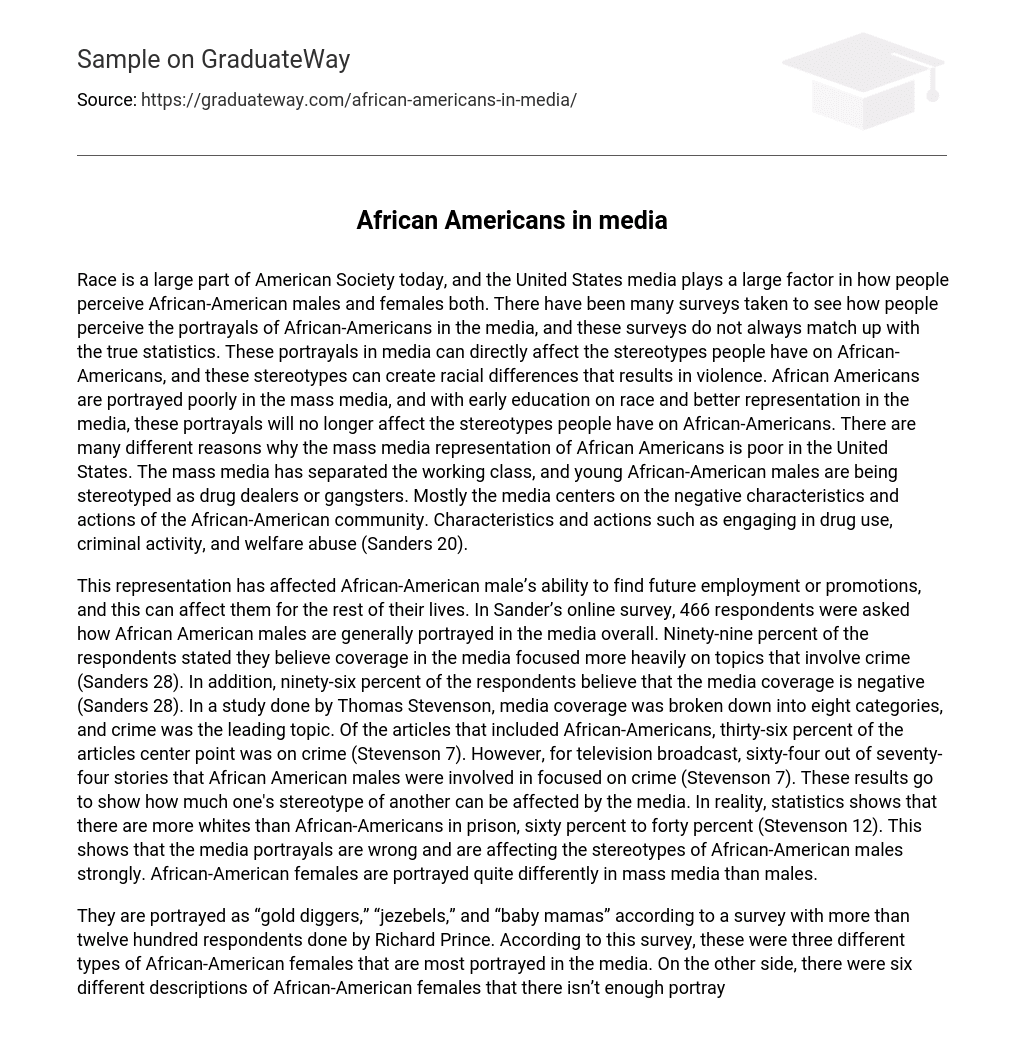The United States media heavily influences the role of race in today’s American society, particularly when it comes to how African-American males and females are perceived. Surveys conducted to gauge public perception often do not align with actual statistics, highlighting a disconnect between media portrayal and reality. This misrepresentation directly impacts stereotypes, leading to racial disparities and violent outcomes. Unfortunately, the mass media perpetuates negative stereotypes by poorly representing African Americans. However, through early education on race and improved representation in the media, these harmful portrayals can no longer influence stereotypes about African-Americans. The unfavorable depiction of African Americans in the United States mass media has various reasons. For example, social class divisions in the media contribute to stereotypes portraying young African-American males as drug dealers or gangsters. Furthermore, focusing on negative characteristics and actions within the African-American community like drug use, criminal activity, and welfare abuse further reinforces negative perceptions (Sanders 20).
The media’s portrayal of African-American males has had a significant impact on their future employment and career advancements, with long-term consequences. According to Sanders’ survey, almost all respondents (99%) believed that the media mainly focused on crime-related topics when covering African-American males, and a large majority (96%) perceived this coverage as negative (Sanders 28). Another study conducted by Thomas Stevenson categorized media coverage into eight categories, revealing that crime was the most common topic. Among articles featuring African-Americans, more than one-third (36%) centered around crime, while out of 74 television stories involving African-American males, the majority (64) were related to crime (Stevenson 7). These findings highlight how strongly the media can shape stereotypes about others. Interestingly, statistics show that there are actually more white individuals in prison compared to African-Americans—60% compared to 40% (Stevenson 12). This emphasizes both the inaccuracies and influential impact of media portrayals in shaping stereotypes about African-American males. In contrast to this representation, mass media presents African-American females differently.
According to Richard Prince’s survey, African-American females in the media are often depicted as “gold diggers,” “jezebels,” and “baby mamas.” The survey also revealed six other descriptions of African-American females that are not adequately shown: young phenoms, real beauties, individualists, community heroines, girls next door, and modern matriarchs (Fujioka 58). The survey indicated that 85% of respondents believe African-American females are portrayed as baby mamas – unmarried young women who have had children. In contrast, only 41% of respondents think African-Americans are shown as real beauties (Fujioka 58). Nonetheless, 85% of respondents feel that the six alternative descriptions mentioned earlier suit African-American females better than the negative stereotypes of baby mamas, gold diggers, and jezebels. African-American women desire positive representation in the media and want their children to grow up with uplifting images and role models. They aspire for a media landscape that does not perpetuate unfavorable stereotypes about their culture.
Addressing the problem of mass media representation of African-Americans is challenging, but possible. It is important to tackle the portrayal of African-Americans in the media and its influence on stereotypes, even though it will require time. Early education on race equality aimed specifically at African-Americans is a crucial initial step towards resolving this issue. By instilling this value from a young age, racism can be minimized and negative stereotypes depicted in the media can diminish. This reduction in negative stereotypes would also lead to less violence, further aiding their decline. Another essential action involves enhancing how the media represents African-Americans.
The portrayal of African-Americans in the media is vital and should not only emphasize negative attributes. Achieving this will necessitate dedication and time, but if accomplished, it can have a beneficial influence on American society. The manner in which African-Americans are depicted in mass media plays a direct role in shaping stereotypes, impacting both how individuals from various races perceive them and how they view themselves. This depiction carries detrimental effects as it encourages violence and perpetuates mistaken notions about African-Americans. Nonetheless, with considerable effort and patience, these stereotypes can be transformed into more positive portrayals that accurately represent the authentic nature of African-Americans.





